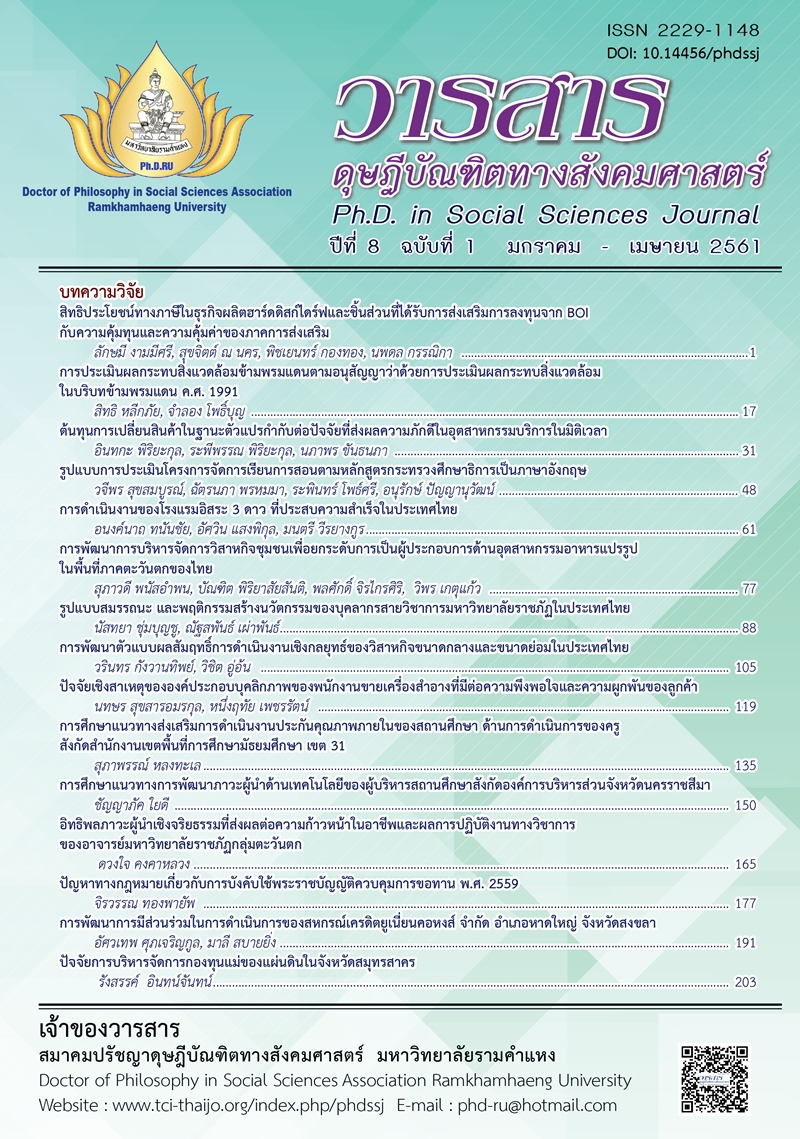THE IMPACT ON ETHICAL LEADERSHIP EFFECTING TO CAREER ADVANCEMENT AND ACADEMIC PERFORMANCE OF THE INSTRUCTORS IN THE WESTERN GROUP OF RATJABHAT UNIVERSITIES
Main Article Content
Abstract
The research aimed to investigate ethical leadership level which affects to career advancement and academic performance of instructors of the Western group of Ratjabhat Universities in the quantitative approach. The samples were 233 instructors of Ratjabhat Universities. Simple Sampling was used to select the samples. The statistical techniques including descriptive statistics and the structural equation model were used to test the hypothesis and analyze path analysis.
According to the result, ethical leadership affecting to career advancement and academic performance of the instructors in the Western group of Ratjabhat Universities found that ethical leadership directly affecting to academic performance of the instructors had statistical significance as the hypothesis mentioned. Ethical leadership directly affecting to career advancement of the instructors had statistical significance as the hypothesis mentioned. Moreover, ethical leadership indirectly affecting to academic performance through career advancement of the instructors had statistical significance as hypothesis mentioned. The analysis of coefficient prediction (R2) of structural equation model was found that both ethical leadership and career advancement could describe that the variance of academic performance was 41 percent.
Article Details
Academic articles, research articles, and book reviews in the Ph.D. in Social Sciences Journal are author’s opinions, and not the publisher’s, and is not the responsibility of the Ph.D. in Social Sciences Journal Philosophy Association, Ramkhamhaeng University. (In the case that research is done on human, the researcher has to be trained in Ethics for Doing Research on Human Training and has to produce the evidence of the training).
References
Bello, S. M. (2012). Impact of ethical leadership on employee job performance. International Journal of Business and Social Science, 3(11), 228-236.
Brown, M. E., & Trevio, L. K. (2006). Role modeling and ethical leadership. Paper presented at Atlanta, Georgia, August 11-16, 2006, Academy of Management Annual Meeting, Atlanta, University of Maryland.
Coles, R. (2002). Lives of moral leadership: Men and women to have made difference. New York: Random House.
Esmer,Y., & Dayi, F. (2014). A new paradigm in management: Ethical leadership (12th ed.). International Academic Conference, Prague.
Erdfelder, E., Faul, F., & Buchner, A. (2007). G*Power 3: A flexible statistical power analysis program for the social, behavioral, and biomedical sciences. Behavioral Research Method, 39(2), 175-191.
Jamshidinavid, B., & Kamar, F. (2012). Ethics in management accounting: Moving toward ethical motivation. Research Journal of Finance and Accounting, 3(6), 90-97.
Liu, C. H. (2007). Transactional, transformational, transcendental leadership: Motivation effectiveness and measurement of transcendental leadership. Los Angeles, CA: University of Southern California, School of Policy, Planning, and Development.
Mihelič, K. K., Lipičnik, B., & Tekavčič, M. (2010). Ethical leadership. International Journal of Management & Information Systems-Fourth Quarter,14(5), 31-42.
Moon, Y. J., Hahn, J. H., Kim, W., Ko, M. J., & Lim, G. H. (2012). Ethical leadership on employees in new SMES: Exploring the moderating effect of gender 2nd Annual Summit on Business and Entrepreneurial Studies (2nd ASBES 2012) Proceeding, pp.499-512.
McCelland, D.C. (1975). Power: The inner experience. New York: Irrington Press.
Nakhon Pathom Rajabhat University. (2013). Academic workbook manual (2nd ed.). Nakhon Pathom: Author. [In Thai]
Nanjundeswaraswamy, T. S., & Swamy, D. R. (2014). Leadership styles. Advances in Management, 7(2), 57-62.
Neubert, M. J., Carlson, D. S., Kacmar, K. M., Roberts, J. A., & Chonko, L. B. (2009). The virtuous influence of ethical leadership behavior: Evidence from the field. Journal of Business Ethics, 90(2), 157–170.
Nahavandi, A. (2002). The art and science of leadership (3rd ed.). Upper Saddle River, NJ: Prentice Hall.
Phymoontree, B. (2016). Factors affecting the research process of personnel of College of Logistics and Supply chain, Suan Sunandha Rajabhat University Nakhon Pathom Education Center. Journal of Logistics and Supply Chain College, 2(2), 47-55. [In Thai]
Piccolo, R. F., Greenbaum, R. L., & Eissa, G. (2012). Ethical leadership and core Job characteristics: Designing jobs for employee well-being. International Handbooks of Quality of Life 2012, pp.291-305.
Sundi, K. (2013). Effect of transformational leadership and transactional leadership on employee performance of Konawe Education Department at Southeast Sulawesi province. International Journal of Business and Management Invention, 2(12), 50-58.
Sergiovanni, T. J. (1989). The leadership needed for quality schooling. In T. J. Sergiovanni & J. H. Moore (Eds.), Schooling for tomorrow directing reforms: To issue that count (pp.213-226). Boston: Allyn & Bacon.
Uche, A. L., Fiberesima, D., & Onwuchekwa, C. A. (2011). Relationship between motivational factors and teachers’ performance on the job in Ogba/Egbema/ Ndoni Local Government Area, of Rivers State. Journal of Social Sciences, 2(5), 23-26.
Walumbwa, F. O., Mayer, D. M., Wangc, P., Wang, H., Workman, K., & Christensen, A. L. (2011). Linking ethical leadership to employee performance: The roles of leader–member exchange, self-efficacy, and organizational identification. Organizational Behavior & Human Decision Processes, 115(1), 204–213.
Werf, M. V. D. (2010). Ethical leadership: the influence on subordinate performance: The mediating role of wellbeing. Amsterdam: University of Amsterdam, Amsterdam Business School.


